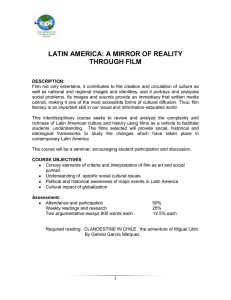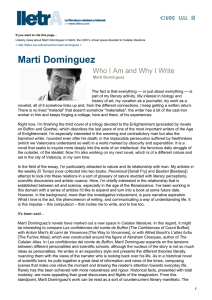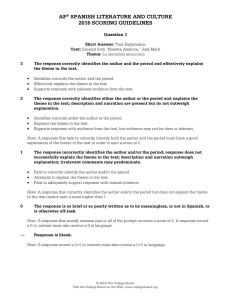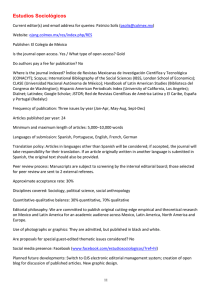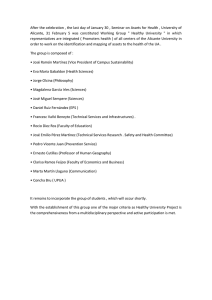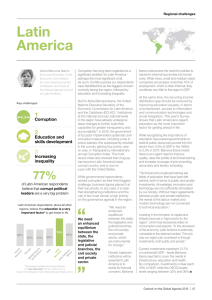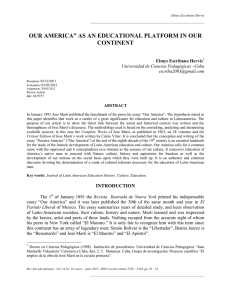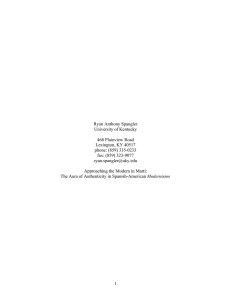To love, think and act from Latin American Titulo Hart
Anuncio
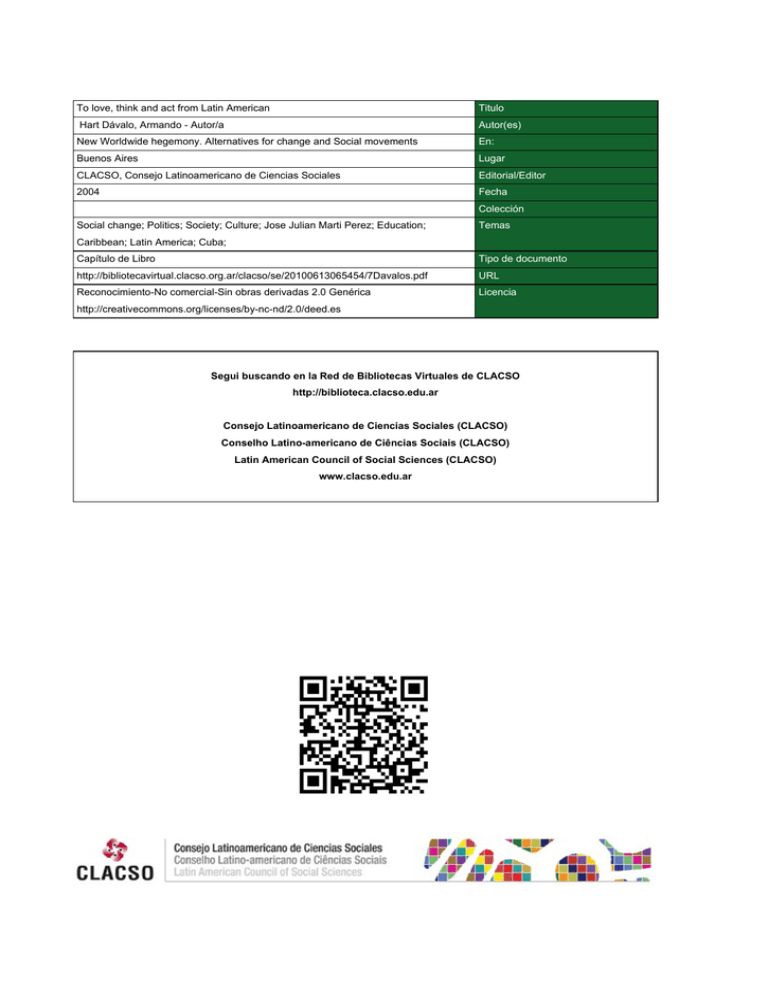
To love, think and act from Latin American Titulo Hart Dávalo, Armando - Autor/a Autor(es) New Worldwide hegemony. Alternatives for change and Social movements En: Buenos Aires Lugar CLACSO, Consejo Latinoamericano de Ciencias Sociales Editorial/Editor 2004 Fecha Colección Social change; Politics; Society; Culture; Jose Julian Marti Perez; Education; Temas Caribbean; Latin America; Cuba; Capítulo de Libro Tipo de documento http://bibliotecavirtual.clacso.org.ar/clacso/se/20100613065454/7Davalos.pdf URL Reconocimiento-No comercial-Sin obras derivadas 2.0 Genérica Licencia http://creativecommons.org/licenses/by-nc-nd/2.0/deed.es Segui buscando en la Red de Bibliotecas Virtuales de CLACSO http://biblioteca.clacso.edu.ar Consejo Latinoamericano de Ciencias Sociales (CLACSO) Conselho Latino-americano de Ciências Sociais (CLACSO) Latin American Council of Social Sciences (CLACSO) www.clacso.edu.ar TO LOVE, THINK AND ACT FROM LATIN AMERICA ARMANDO HART DÁVALOS* FOR A CUBAN who tries to be coherent with the history of Cuba and of America it constitutes an immense honor to have been granted the privilege of transmitting a message to the people present here. It also implies a great responsibility because I must do it in the name of the culture represented by José Martí. The Apostle and Simón Bolívar are the topmost symbols of the history of America; they represent a culture that since its conception has been linked to the immediate problems of our historic development and, therefore, can today provide answers and point out possible paths for facing the challenges of the current world. As President Fidel Castro pointed out at the close of the International Conference for the Balance of the World, held in homage to the 150th anniversary of José Martí’s birth, our Apostle identified God with the idea of good. In the name of Martí’s acceptance of God, that is, of good, I bring the word born of our deepest convictions that flower from loves and thoughts rooted in our spirit. To love, to think and to act – this is the message of Martí that I would modestly like to expound to you. * Education Minister since the victory of the Cuban Revolution until 1965. Director of the Office of the Martí Program attached to the Council of State. He is president of the José Martí Cultural Association. 117 NEW WORLDWIDE HEGEMONY. ALTERNATIVES FOR CHANGE ANDSOCIAL MOVEMENTS The natural sciences have created symbols for delving into knowledge about a reality that encompasses both the infinite spaces of the Universe and the inexhaustible micro world. Without them we would not have attained the heights of knowledge that man has conquered. Those of a social character also require their own symbols. They are present in the great social, economic, cultural and political processes. Also in the people and in the individuals who represent and promote them. Myths and symbols are indispensable for establishing relations within human consciousness between levels of reality that present themselves as contradictory and as vastly separate in space and time. In a world burdened by ferocious and vulgar materialism that expresses a very dangerous fragmentation of reality, they are more necessary than ever before in history. They must enable us to find and extract conclusions regarding the invisible thread that –according to Martí– links individuals in history. We will thus be able to understand the drama which originates in the past and to attempt to envision a future that can only be attained with the actions of millions of people and of many generations. Let others reject the need for myths and symbols. People –as Mariátegui said– need multitudinous myths. Martí’s apostleship is therefore more current and necessary than ever. Over a hundred years ago, conservative European thought reached the conclusion that by the end of the twentieth century the decadence of the West would take place. Similarly, the illustrious Cuban patrician Salvador Cisneros Betancourt pointed out at the beginning of the nineteenth century that the path that the United States then trod would lead to the decadence of its immense power and warned, thinking about Cuba, that United States leaders should always remember that there is no small enemy. Already in 1887, on presciently analyzing the dangers that were shaping up from the United States, our National Hero pointed out: “Like immense and slow phantoms, the vital problems of the Americas are arising in space: the times demand something more than factories of the imagination and the generation of beauty. On all faces and in all countries, as symbols of the era, one can see hesitation and anguish. The entire world is now an immense question mark.” How to answer this question in the twenty-first century when the challenge presents itself in a more dramatic and universal manner? As this conference itself demonstrates, Latin America and the Caribbean is the only region of the world with the possibility to draw up a consistent thesis in relation to the major challenges that the twenty-first century poses us, and we can do it with the participation of illustrious representatives of the North American people such are present here. 118 ARMANDO HART DÁVALOS It is in Latin America and the Caribbean where the indispensable cultural reserves are located for facing the grave crisis we have before us. Our Americas can, due to economic and social factors linked to our immense spiritual tradition, present formulas for a dialogue with the world, including the North American people and society themselves, in relation to the future of humanity. For these reasons, I invite you to study Latin American thought and specifically that of Martí, who arrived at a set of universal ideas not only through abstract formulations, but also by pointing out some very concrete things. A genius with words, he said that doing is the best way of saying. He set this out brilliantly in prose and in poetry. He also confirmed it in his actions, ideas and principles that serve to know and understand a reality which one often cannot reach with rational thought. His scintillating verses delved into substantive aspects of human sensibility and managed to reveal truths and feelings that were hidden in the skein of a rationalism which by virtue of being exaggerated and inconsistent has become irrational and has led us into the most atrocious primitivism, because when intelligence isn’t accompanied by love it turns into error, evil and irrationality that nurture the criminal instinct. As I have said, the genius of the Apostle resides in these analyses: love, reason and a vocation for action, this is what he taught us. Since this synthesis can only be attained on a social and historical scale with a culture inclined toward action, the Apostle took it to the terrain of facts and to his pedagogical ideas and to those on cultivated politics. This leads to an understanding of the possibilities and needs of a philosophical elucidation oriented towards drawing up programs such as are needed by today’s world. Let us issue a reflection on the basis of what the cultured Europe called the New World, that is to say, from Alaska to Tierra del Fuego, and of the role it should perform in this new century. In the Manifesto of Montecristi which Martí signed along with General Máximo Gómez in May 1895, by which they explained to Cuba, America and the world the bases for Cuba’s drive toward independence, essential ideas were pointed out which are still astonishingly current. For example: “The war of independence of Cuba, locus of the array of islands which, within the span of a few years, the trade of the continents will run through, is an event of great human scope, and a timely service that the judicious heroism of the Antilles offers toward firmness and fair treatment among the nations of the Americas, and toward the world’s still vacillating balance.” In a letter to his very close Mexican friend Manuel Mercado dated May 18, 1895, unfinished because death stole up on him the next day, he pointed out that everything he had done and would do 119 NEW WORLDWIDE HEGEMONY. ALTERNATIVES FOR CHANGE ANDSOCIAL MOVEMENTS would be to “prevent in time, through the independence of Cuba, having the United States spread through the Antilles, and having it fall even harder with that power on our lands of the Americas.” The Apostle did not forget a substantial aspect; he sent a message to the United States people when, on another occasion, he stated that the Cuban war of independence was also being carried out to save the honor of the great northern republic which would find a more secure greatness in the development of its territory –unfortunately already feudal and split into hostile sections– than in the ignoble conquest of its smaller neighbors and in the war which the aligned world would have to wage against its ambition. It is the vision of Martí that we wish to have reached all the people of the world and especially that of the United States. As I was listening to the extremely interesting speeches of the first day1, I asked myself what the reaction of United States society may be in the face of the universal drama that the oligarchy of that country is strongly unleashing. I have faith in the potentialities, in the best democratic tradition of the United States, and trust that sensible people will emerge in that nation’s leadership who will understand that they have no possibility of relating to the world other than on the basis of a crucible of ideas such as those of A. Lincoln, R. W. Emerson –whom José Martí so admired– and Martin Luther King, whose symbol will grow ever greater in the midst of the United States people. It is very important to take into account that Martí conceived these ideas in the heart of the United States –a land where he resided for more than a third of his life– precisely at the time that the imperialism was taking shape. It was there that he crowned his thinking and turned into the most profound analyst of U.S. reality in the latter half of the nineteenth century. For this reason, his ideas on balance permit a philosophical enlightenment that serves to draw up the political and educational programs that we need today. There are two key ideas in Martí that help us to locate, on a philosophical foundation, the political, educational and cultural paths along which to face these processes. They are firstly the views on world balance that we have previously referred to, and secondly the usefulness of virtue and the possibilities of human improvement. The idea of a world balance is based, like his entire worldview, on the integrity of the diverse orders of reality as an essential guiding law ruling nature, art, science, economics and social relations. And since this synthesis can only be attained on a social and historical scale when 1 See the articles by Francisco de Oliveira and Samir Amin in this same volume. 120 ARMANDO HART DÁVALOS oriented toward action, the Apostle applied it to the spheres of education, culture and practical politics. On the basis of these conclusions, we issue an invitation to study his ideas regarding what he called the science of the spirit, his standpoints on the relations between evil and stupidity and between goodness and intelligence, his statement that the meaning of humanity resides in the capacity to associate together, his criterion regarding the importance of education and culture in human liberation and his eth ical ideas. Martí’s statement regarding every individual being a dormant beast should also be studied. “It is necessary to place a leash on the beast. And man is an admirable beast: he has the attribute of carrying his own leash.” The leash is culture. All these aspects constitute essential keys to reaching a conception of the world on the basis of justice and of solidarity among men. This crucible of ideas analyzed in relation to the best universal philosophical thinking makes manifest a measure of science and utopianism, of reality and dream such as is required to attain a better world. This is because in Martí there took place a synthesis of the immense knowledge of European modernity; the purest ethical tradition with Christian roots, which from the outset didn’t place itself in Cuba in an antagonism with science; the unbiased influence of Masonic ideas in their most universal sense and in their sense of human solidarity; the Bolivarian and Latin American tradition that he enriched with his life in Mexico, Central America and Venezuela, and the anti-imperialist ideas and sentiments arising from the very innards of the U.S. empire where he lived more than fifteen years, and where he rounded out his political, social and philosophical thinking from the viewpoint of Latin America’s interests. He was undoubtedly the most profound analyst of United States reality in the second half of the nineteenth century. In 1892, José Martí founded the Cuban Revolutionary Party and three years later, after intense political and organizational labors, he issued a call to the necessary war against the Spanish empire that turned out to be the prelude to combat against the incipient U.S. Empire. In the 1920s this patriotic and anti-imperialist tradition blended with the socialist ideal and deepened its popular content and its content of social justice. In this way, Cuban culture reached the new millennium with the highest synthesis between European thinking and that of the New World, and in so doing took on the articulation between Europe and the Americas on the basis of half a century of practical experience in the confrontation with the imperialist policy and therefore with the greatest technological and economic power that has ever 121 NEW WORLDWIDE HEGEMONY. ALTERNATIVES FOR CHANGE ANDSOCIAL MOVEMENTS existed in humanity and which is, additionally, located 90 miles from our shores. A nation that has had this capacity for combat and for resistance to face such grievous obstacles for around a hundred and fifty years has the ability to provide answers to the essential problems facing the Cuba of today and of tomorrow but which –let it be clearly known– affect not only our country, but involve all mankind. If in the twentieth century anti-imperialist thinking and its radical universal humanism were exalted, in the twenty-first it is necessary to study the philosophical ideas of Martí that are indispensable not only for our country but for America and for humanity as a whole. There is no alternative to posing problems of a philosophical character, leaving behind terminologies of European making that set up a barrier against the masses, and taking up the thinking of the greatest philosophers of all times again. Antonio Gramsci stated that every great philosophy starts out with a critical analysis of the formulations of common sense. Let us consider the first: every person needs to eat, clothe himself, and have a roof, before engaging in philosophy, religion and culture. From it, let us derive the second: there is no man, in the universal sense that we all know, without culture. What teaching do we Cubans extract today from these ideas and their ulterior consequences? The first and most important lesson resides in that the main deficit of what was called the left in the century that has concluded was to have divorced social and class struggles from the best Latin American cultural tradition. This did not occur that way in Cuba. Among us, as I have already pointed out, the political, economic, social and cultural ideas arising from two major sources were articulated in the twentieth century: the historical materialism of Marx and Engels, which is the highest stage reached to date by European philosophy, and the culture on Latin American and Caribbean foundations whose highest stage exists in José Martí. At a universal level, in the twentieth century it proved impossible to relate the great discoveries of historical materialism to the weight of subjectivity in history itself. For this purpose there lacked culture. This incites us in the twenty-first century to study, in the light of the human sciences and their great discoveries, the importance of the subjective factor in understanding the events we have before us. Hence the value of Fidel Castro’s words when he insists that culture is the essential element for national and international politics at these crossroads times. 122 ARMANDO HART DÁVALOS The material foundations of civilization require culture, as a need; without it they would lack the immense accumulated wealth, without it there wouldn’t really be a highly developed economy. When the noble aspirations of liberty, equality and fraternity have been tossed overboard by the vulgar materialism that has been imposed in the world that is called unipolar, we Latin Americans and Caribbeans present ourselves with a universal cultural richness of the highest humanistic value. It is difficult to find another region of the world that by virtue of its history and traditions possesses the vocation of solidary universality of Latin America. Among us the narrow and fanatic nationalisms that are painfully present in other regions don’t exist. Latin American and Caribbean nationalism includes the ideal of multinational integration and a generous disposition to embrace the world. We set out from a tradition of spirituality and ethicality that is manifested in the search for a better tomorrow for the world. It is present, in an unmistakable manner, in the major movements of ideas that have taken place over the last fifty years in our broadly-defined fatherland. They are: the renewal in socialist thinking that was generated by the Cuban Revolution and that we represent in Fidel Castro and Ernesto Guevara; the artistic and literary explosion, and the esthetic thinking related to, and having its bulwark in, Alejo Carpentier and the marvelous real; the social and philosophical thinking and the ethical dimension that we notice in the theology of liberation when we analyze it as a function of the kingdom of this world; the popular-education movement. These idea processes have a common denominator: they take reality very much into account and, likewise, pose themselves a utopian vision, i.e., a project, an aspiration, an ideal of human improvement toward the future. The crisis in Western thought resides, precisely, as we have already pointed out, in that it divorced these two categories: utopianism and science. Latin America can, on the basis of its history and traditions, present a solution that twins intelligence and love as a liberation project. Selfishness doesn’t need to be encouraged; it exists with a spontaneous force that is often overwhelming and destructive. Love and solidarity are the higher features of human intelligence that require stimulation. An endeavor aimed at promoting ideas and feelings of solidarity lies at the essence of the postulate of José Martí that is required for the social and historical balance of individuals, communities, nations and humanity as a whole. The social agents of change posed by Marx and Engels turn out to be insufficient. They were presented for the Europe of the nine123 NEW WORLDWIDE HEGEMONY. ALTERNATIVES FOR CHANGE AND SOCIAL MOVEMENTS teenth century and we are in the western hemisphere of the twentyfirst century. It is essential to find new categories to conceive the way of changing the world. The drive toward transformation must be materialized from the starting point of the fully objective fact that current events are related to material and spiritual needs derived from the identity of communities, nations and groups of nations given the geographical area, given their aspiration toward a higher civilization, and given the existence of the universality which is today called globalization. Let us study postmodern challenges on the basis of these three categories: identity, civilization and universality. These have economic roots, and the vortex of the postmodern cyclone passes through them. This is the new dimension that has been reached by the social, historical and cultural drama in the years following the fall of the Berlin wall. At the end of the Second World War these confrontations were already discerned and unfolding, but the existence of a bipolar balance contained, or at least mitigated, a radical rupture of such conflictive relations. Latin America and the Caribbean are in a condition to offer, in answer to the evident fragmentation and decadence of Western thought, the solidity of our cultural tradition and its utopian value directed toward the aim of integration. In practical terms, what does this aspiration toward universality compel us to? In the first place, we must not fall into the trap of analyzing our relations with the United States by focusing on the political issue exclusively within the framework of the interests and criteria that are handled in the midst of that country’s government elite. It must be done from a wider perspective; it must be adjusted and must take into consideration the possible influence to be exerted on the public opinion and people of the United States. It is necessary, at the same time, to effect an international mobilization of the widest social sectors in favor of the aims we pursue. Secondly, we mustn’t have the slightest weakness or slackness in the face of the arrogant policy of United States governments. As the Che pointed out, we cannot make the slightest concession to the imperialists. This formulation has today greater reasons for being applicable than when Ernesto Guevara issued it. In the third place, it is necessary to ensure the unity of the people, division being one of the factors that most weakens the people’s capacity to struggle, to advance and to resist; for these reasons, we Cubans look after unity as after the apple of our eyes. 124 ARMANDO HART DÁVALOS Fourthly, unity and firmness in the face of hegemonic and unipolar power demand the defense of the interests of the immense majority of the population, and respect for the tradition of our peoples, which is expressed in their culture; within it, the role performed by intellectuals is of enormous importance. All this leads us to exalt the role of the pedagogical practice and practical politics that constitute the most singular constriction made by the Apostle to the history of political and educational ideas. They are also linked to the immense juridical culture that has an ample tradition in our people. In this manner, pedagogy, politics and the law must be articulated to form a powerful front of ethical concepts and principles, which is an essential subject of the politics of our times. Governability is talked about. It is, however, impossible without the law and without ethics. In the current world, for it to be possible, justice must be recognized in its most widely encompassing and universal sense. Say “man” and all rights have been said, stated the Apostle. He also declared: “Let the world be grafted onto our republics; but the trunk must be that of our republics.” And for this to happen and have the ability to promote stability in the present and toward the future, it is necessary to have ethics and law guaranteeing universal justice. For such elevated proposals what is indispensable is a democracy with full popular participation and with the incorporation of all social sectors without discrimination of any kind. This requires new forms of government very different from those of the past. A thinking that may serve as the trunk for our ideas must not be sought outside our fatherlands; it must be sought in the history of our countries. On the basis of what is ours, we can find in that history that which is essentially Latin American as a creative force to face the challenge that today’s world finds before it. With regard to this principle, José Martí averred, “The incompetence does not reside in the incipient country, which requires forms suited to it and useful greatness, but in those who want to rule original countries, with a singular and violent composition. With laws inherited from four centuries of free practice in the United States, from nineteen centuries of monarchy in France. With a decree by Hamilton one cannot the halt the charge of the plainsman’s horse. With a phrase by Sieyès one cannot end the stagnation of the clotted blood of the Indian race (...). The government must be born from the country. The spirit of the government must be that of the country. The form of government must be suited to the way the country itself is constituted. The government is nothing else than the balance of the natural elements of the country.” For all this, political action is necessary, and, in turn, it is indispensable to delve deeply into the best political ideas. I have main125 NEW WORLDWIDE HEGEMONY. ALTERNATIVES FOR CHANGE AND SOCIAL MOVEMENTS tained that the singularity of the politics of José Martí, and of his disciple Fidel Castro, resides in having overcome the old watchword, with its reactionary tradition, of “divide and conquer,” to establish the principle of “unite to win.” However many analyses we carry out in the infinite maze of economic facts and figures, the path to a solution to these problems can only arrive from political ideas and watchwords. This is the only way of breaking with the horrendous vicious circle into which politics fell in the twentieth century, and it is what will lead us to practice. Since the late 1940s and early 1950s our country’s most progressive forces exalted the watchwords of political freedom, economic independence, social justice, and combat against corruption and immorality. The first three were the reflection of the social and economic struggles that our country undertook for its liberation. The fourth expresses the need to fight corruption and the violation of ethical and juridical principles. This latter is a key issue for any revolutionary. Those in the Americas who aspire to the liberation of their people must begin by condemning the violations of the law and the immorality, the vices, the larceny and the thievery of traditional politicians. Cuba’s road to socialism started out that way. It is a reflection that I consider perfectly valid, in the current circumstances, for any process of change that is carried out among our people of the Americas. Let us definitively overcome divisive “isms”; let us seek out, with elective methods, as was propounded by the Cuban philosophy of the beginning of the nineteenth century, the path of the truth, and through this selection we shall find the social and philosophical thinking that the Americas require. We shall never find it with Byzantine debates about the diversity of philosophical and political systems that came to us from outside, whichever they are, from what was called the left or from what was called the right. Enough of talking about culture without grasping that its primary value is justice. It is necessary to be well-educated, but one must aspire to culture in its widest sense; justice must be exalted to the highest level, suitable for defending the interests of all people, be they New Yorkers, Afghans, Iraqis, Cubans, Argentines, French, Chinese or Vietnamese. In one word, all, without exception. To sum it up I will quote two ideas of President Fidel Castro that may illustrate what we are stating: “Great crises lead to great solutions.” And this other one: “The great asset of the human mind for the future consists in the enormous potential of genetically received intelligence that we are incapable of utilizing. This is what we have at out disposal, there resides the future (...).” 126 ARMANDO HART DÁVALOS In order to find that formula let us, as the Apostle did, relate goodness to the intelligence and happiness of each individual, on one hand, and evil to stupidity and the unhappiness of the other. This can be studied on an individual scale and also at a social level. The modern advances in psychology confirm this thesis of Martí’s that the feelings, the emotions and the intellectual capacity of the individual are in a very direct relationship and are those which allow individual balance within each person in particular; and it also finds its confirmation in descriptions made in the physiological field of the operation of the human mind. This, of course, is valid at a social and historical level; it can be verified through the detailed examination of universal history. Political and social systems perish not only through evil, but also because they are guided wrong-headedly; this is demonstrated through the history of Cuba by its relation with Spanish colonialism first and later with U.S. neocolonialism. It is a historical truth that must be taken very seriously into account when the twilight of the system of capitalist domination, loaded with perils for humanity, is taking place. But as Fidel Castro has said, this is a period that additionally offers possibilities for generating wealth and greater happiness for all people. Yes, we are in a period following the modern era, that is to say, it is postmodern, characterized by the greatest and most profound crisis in the institutions and political, legal, ethical and cultural values of so-called Western civilization. Those that retain their formal validity are already impotent for facing the drama of humanity in the recently begun century; for this reason, it becomes necessary to create a space for the study, research and promotion of ideas about the need for balance in the world, one that is led by a dialogue removed or distant from the enormous limitations imposed by the world’s immediate conflicts of a practical nature. To this end, the International Conference for the Balance of the World agreed to organize the José Martí Project of World Solidarity aimed at the creation, on an international scale, of a space for reflection, study, research and the promotion of ideas on the need for balance in the world oriented toward serene dialogue, removed from the enormous limitations imposed by the conflicts of an immediate political character of the current world. We aspire to promote the widest possible representation of civilizations and people of the world, of the international organizations most vitally interested in these goals, and –on the basis of the universal consensus expressed in the creation of the United Nations after the World War– to support the updating of the multilateral ideals that will guarantee the right of nations, people, cultural identities and human beings to peace, culture and economic 127 NEW WORLDWIDE HEGEMONY. ALTERNATIVES FOR CHANGE ANDSOCIAL MOVEMENTS and social development. We call on all those present to offer their backing to this initiative that already enjoys the endorsement of UNESCO. We are the inheritors of a beautiful intellectual tradition that allows us, today more than ever, to think with our own head and –as Martí indicated– to make the forms of government emerge from the country itself. We stand at a crucial moment in the history of the world and of our Americas. The new factor that presents itself is that while socalled Western civilization finds itself at a pessimistic and right-wing crossroads, our Americas today contain the –at least initial– seeds of a world of hope. When Martí was told that the proper atmosphere was lacking for the war of independence, he replied that he wasn’t speaking of atmosphere but of subsoil. In Latin America there is a world of hope that additionally is already emerging toward the surface in the entire hemisphere. Compare the political situation of the current world with the fact that there exist five Latin American states where major changes are gestating –I refer to Argentina, Brazil, Venezuela, Paraguay and Bolivia. The recent events in Bolivia confirm the bankruptcy of neoliberal policy and the fact that the masses are becoming conscious of the real causes of the problems that burden our countries. Let us not forget this because, emerging from the subsoil of the Americas, is the greatest hope of the world of today. I am not being triumphalist; I know the difficulties well and I also know that the changeover is very difficult, but the seeds have been sown, the beginnings are there; let us make us of them and search, employing every means, for the way to give an ideology, philosophy, theory to the new process that is taking shape and that appears, strongly, in the idea of the Social Forums of São Paulo: another, better world is possible. Latin America is in the vanguard for finding that better world. Let us fulfill the commitment we have as the small human genus. Martí said in relation to the Cubans who refused to fight for independence that it seemed unbelievable that with such a glorious future ahead there were people born in our land who would bind their lives to Spain’s rustic and rotten monarchy. Paraphrasing these ideas of the Apostle’s, we can say that it is incredible that there are Latin Americans who, in the twenty-first century, reject the determination to help the world with the ideas of our national heroes and thinkers and bind their lives to decadent and corrupt imperialism. 128 ARMANDO HART DÁVALOS Let us unite our intelligence and our hearts to say to our people and to all of humanity: a better world is possible. It is the moral republic of the Americas, the formula of triumphant love that Martí prophesied. 129
